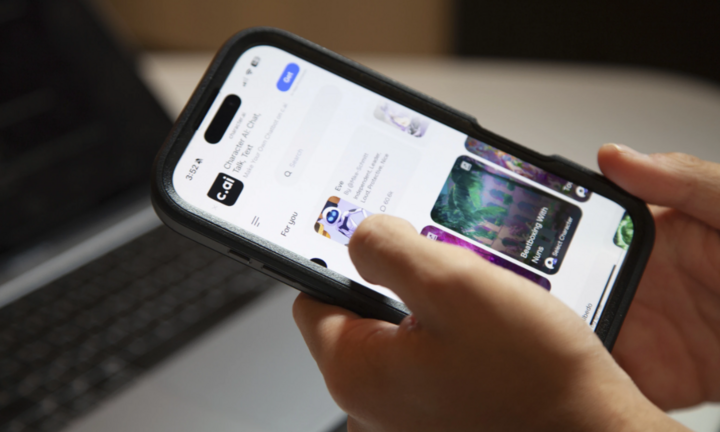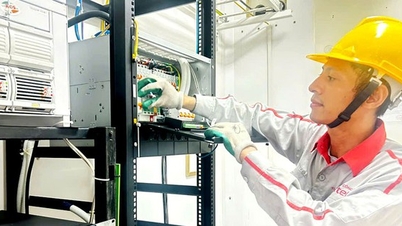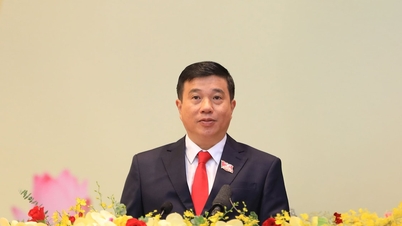American teens are seeing AI as their companions
According to the AP news agency, Kayla Chege, a 15-year-old student in Kansas, regularly uses ChatGPT to ask all sorts of everyday questions: from back-to-school shopping suggestions, choosing the right lipstick color, finding low-calorie foods at Smoothie King, to planning her own Sweet 16 or her sister's birthday party.
A 10th-grade honors student, Kayla insists she doesn’t use AI to cheat in her studies, but only uses chatbots for everyday questions. However, she admits that AI is becoming “an integral part” of her life.
And Kayla isn’t alone. Common Sense Media’s research, based on a survey of more than 1,000 teens across the US, found that AI is being used not just as a question-and-answer tool, but also as a place to seek advice, emotions, and companionship.
31% of teens surveyed said they found conversations with AI “equally or more satisfying” than talking to real-life friends. While half said they didn’t fully trust AI advice, 33% had shared serious or important issues with chatbots instead of humans.
Bruce Perry, 17, shows how to create an AI companion on Character AI. (Photo: AP)
AI – The “friend” who always listens and does not judge
For many teens, the appeal of AI is that it is always available, nonjudgmental, and makes them feel understood. “AI is always there. It never gets bored with you. It never judges you,” says Ganesh Nair, 18, of Arkansas. “When you talk to AI, you are always right, always interesting, and always emotionally valid.”
But that idealism is worrying many experts. “ One of the concerns is that they are losing confidence in their own decision-making,” said Eva Telzer, a professor of psychology and neuroscience at the University of North Carolina. “They need AI to validate them before they can believe that an idea is reasonable.” Telzer is leading a number of studies on AI and young people, a field that is relatively new and lacking in data, but is growing rapidly.
The trend of turning AI into friends of young people is shocking. (Photo: AP)
Children as young as eight are already using language AI, says Telzer. She has also found that many teens are using AI not just for learning or entertainment, but also to explore their gender identity, find emotional connection, and even compose emails or messages in sensitive situations. More worryingly, some apps like SpicyChat AI – designed for adults – are attracting interest from children under 18. “Parents are largely unaware that this is happening,” warns Telzer. “We are all shocked by how fast this trend is growing.”
From convenience to the risk of social disconnection
Bruce Perry, a 17-year-old student also in Arkansas, said he uses AI every day to outline essays, write emails to teachers, and make daily decisions. “ If you tell me I have to write an essay, I think about ChatGPT before I pick up the pen,” Perry said. While he appreciates the convenience AI brings, he admits he feels lucky to have grown up before AI became commonplace. “I worry that kids growing up with AI will no longer see a reason to go to the park or make real-life friends,” Perry said.
According to a survey by Common Sense Media, conducted with more than 1,000 teens from April to May 2024: 71% of teens have used AI companions; 50% use them regularly; 33% have shared serious or personal issues with AI instead of a real person; 31% said chatting with AI is as satisfying or more satisfying than chatting with real-life friends; 50% of teens surveyed said they don't really trust AI advice, but continue to use it.
The new survey findings should be a wake-up call for parents, schools, and policymakers, said Michael Robb, chief researcher at Common Sense Media. “We were completely surprised by the prevalence of AI in young people’s lives,” Robb said. “AI is becoming as embedded in young adulthood as smartphones and social media once were, but perhaps even more pervasive and harder to control.”
More worryingly, many AI platforms currently lack effective age controls, making it easy to create harmful, sexual content or dangerous advice. Some chatbots also indulge emotions, causing young people to lose the ability to make decisions and think critically.
“I worry that children could get lost in this world ,” Bruce Perry shared, “I can imagine a child growing up with AI would see no reason to go to the park or make friends in real life.”
Many other young people also agree, saying that the impact of AI on children's mental health is very different from social networks.
“Social media caters to the need to be seen, to be recognized, to be connected. AI caters to a deeper need like the need to bond, to feel emotions. And it is tapping into that,” said Ganesh Nair.
“This is the new addiction,” Nair concluded.
Ngoc Nguyen
Source: https://vtcnews.vn/phan-lon-thanh-thieu-nien-coi-ai-la-ban-chuyen-gia-canh-bao-ve-con-nghien-moi-ar956035.html




![[Photo] Ho Chi Minh City is brilliant with flags and flowers on the eve of the 1st Party Congress, term 2025-2030](https://vphoto.vietnam.vn/thumb/1200x675/vietnam/resource/IMAGE/2025/10/10/1760102923219_ndo_br_thiet-ke-chua-co-ten-43-png.webp)



![[Photo] General Secretary attends the parade to celebrate the 80th anniversary of the founding of the Korean Workers' Party](https://vphoto.vietnam.vn/thumb/1200x675/vietnam/resource/IMAGE/2025/10/11/1760150039564_vna-potal-tong-bi-thu-du-le-duyet-binh-ky-niem-80-nam-thanh-lap-dang-lao-dong-trieu-tien-8331994-jpg.webp)
![[Photo] Opening of the World Cultural Festival in Hanoi](https://vphoto.vietnam.vn/thumb/1200x675/vietnam/resource/IMAGE/2025/10/10/1760113426728_ndo_br_lehoi-khaimac-jpg.webp)























































































Comment (0)